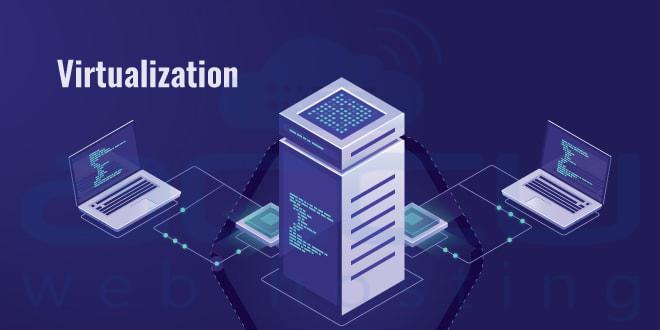It is vital to stay on top of today’s rapidly advancing technological landscape. Virtualization has transformed industrial processes in recent years. It has revolutionized things beyond our wildest imaginations. In this blog post, we’ll explore how virtualization is reshaping the tech landscape by operating multiple operating systems on a single machine and seamlessly expanding IT infrastructure.
Virtualization: Unveiling the Wizardry
Before we delve into the impact, let’s decode the wizardry behind virtualization, adding to the argument of bare metal vs. virtual machine, as we think of the benefits of the latter. Virtualization creates virtual versions, whether an operating system, a server, or a network. It’s like having a bag of jellybeans and being able to split them into different flavors without changing the original bag – your physical hardware in this case.
Breaking Free from Hardware Shackles
Virtualization breaks down the traditional barriers of hardware. In other words, you can run Windows on your Mac, Linux on your Windows, and so on all on the same device, using this technology. You can run multiple virtual machines (VMs) on a single server. VMs behave like independent computers with their own operating systems and applications.
Efficiency at its Best
Imagine having a room full of servers, each dedicated to a specific application. It’s not only space-consuming but also a nightmare to manage. Virtualization changes the game by consolidating these servers into a handful of physical machines. This consolidation not only saves space but also slashes energy bills and reduces the carbon footprint.
The Tech Industry’s Love Affair with Virtualization

Now that we have a grasp on what virtualization is, let’s see how it’s playing cupid for the tech industry.
Revolutionizing Data Centers
Data centers are the beating heart of the digital world, and they’ve experienced a seismic shift thanks to virtualization. In the old days, a single server hosted a single application, leading to massive inefficiencies. With virtualization, multiple VMs can run on a single server, optimizing resource utilization. This means faster data processing, higher availability, and cost savings that make CFOs grin from ear to ear.
Cloud Computing: Riding the Virtual Wave
Small businesses and large corporations alike can easily scale up and down their resources with the cloud. In order to provide scalable and cost-effective cloud services, several cloud providers, including Amazon Web Services, Microsoft Azure, and Google Cloud, rely heavily on virtualization.
The DevOps Revolution
Developers and IT operations teams used to be like oil and water, never quite mixing. Enter DevOps, a cultural shift that brings these two worlds together. Virtualization enables DevOps practices by providing developers with sandboxed environments to test their code. This means fewer “it works on my machine” moments and faster, more reliable software deployments.
Disaster Recovery Made Easy
With virtualization, disaster recovery has never been easier. By replicating your entire IT infrastructure as virtual machines, you can recover from hardware failures or cyberattacks. Your data will remain safe while your business runs.
Virtualization in Everyday Life
Virtualization isn’t just for the tech giants; it’s making its mark in our daily lives too.
A Playground for Gamers
You can now run multiple operating systems and graphics-intensive games on a single computer thanks to virtualization. No more dual-booting or investing in separate gaming rigs. The gaming community is embracing virtualization as a way to have their cake and eat it too.
A Lifeline for Legacy Software
Ever tried to run a beloved, but ancient, piece of software on a modern computer? It’s like trying to fit a square peg in a round hole. Virtualization offers a lifeline by creating environments where legacy software can thrive. Your nostalgic trip down memory lane just got a lot smoother.
The Road Ahead
As virtualization continues to shape the tech industry, what does the future hold?
Edge Computing Takes Center Stage
The rise of the Internet of Things (IoT) has paved the way for edge computing, where data processing happens closer to the source. Virtualization plays a pivotal role by enabling efficient resource management at the edge. This means quicker response times for IoT devices and more robust, real-time applications.
Enhanced Security and Isolation
In the digital age, security is paramount, and virtualization is stepping up to the plate. Virtual machines can be isolated from one another, making malware more difficult to spread. Security professionals are exploring innovative ways to leverage virtualization to fortify our digital defenses.
Quantum Leap in AI and Machine Learning
Virtualization isn’t limited to just traditional computers. Using quantum computing, which is based on virtualization at a subatomic level, AI and machine learning could be revolutionized.
Conclusion
Virtualization isn’t just a buzzword; it’s a game-changer for the tech industry and beyond. From revolutionizing data centers to making gaming dreams come true, its impact is undeniable. As technology continues to evolve, virtualization will remain at the forefront, breaking down barriers, and opening doors we’ve yet to imagine. So, the next time you run that Windows app on your Mac or spin up a cloud server in seconds, tip your hat to virtualization – the unsung hero of the tech world.

